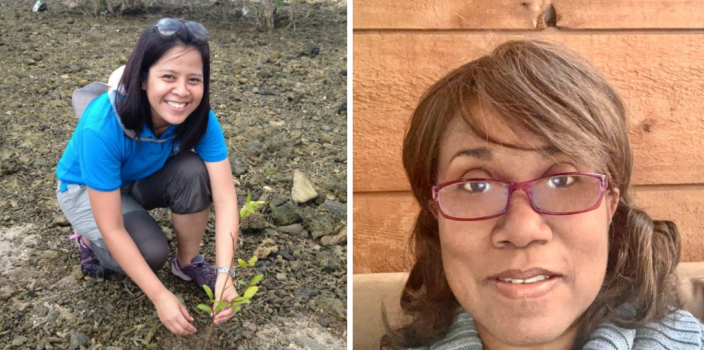Haiti and Philippines Leaders Lauded as 2021 Water Warriors
On World Water Day, March 22, 2021, USAID announced its second annual Water Warrior Awards, which recognizes the value of its water, sanitation, and hygiene (WASH) leads who work on the front lines with local partners and communities. This year’s winners, Joanne Dulce of USAID/Philippines and Marcia Urquart Glenn from USAID/Haiti, work tirelessly in their pursuit of effective programming to help USAID meet its goal of sustainable management of safe water and sanitation for underserved and vulnerable communities. These two awardees were selected from an impressive pool of nominees that came from diverse corners of the world and cover a wide range of WASH portfolios. We congratulate them for their demonstrable efforts.
The access to WASH services that Ms. Dulce and Ms. Glenn promote remains essential to the long road ahead to economic recovery from the COVID-19 pandemic. Reduced access to WASH has further undermined economic recovery and sustainable development, limiting the potential output of industries reliant on water, new businesses, and workers.
As USAID/Philippines WASH lead, Ms. Dulce manages the development and implementation of the new flagship $18 million Safe Water Project, which targets support to cities with economic growth potential that also have large gaps in WASH services. Understanding the unique economic stress that COVID-19 placed on both customers and water utilities, Ms. Dulce facilitated Safe Water’s local application of an innovative stress test analysis for water service providers, which provides invaluable information and assistance for partners to manage the financial challenges brought on by the pandemic as well as provide broader policy recommendations for national regulatory changes to support the sustainability of water utilities.
Before Safe Water, Ms. Dulce masterfully managed the Be Secure Activity, which increased access to water supply/sanitation services for 2.8 million people. Always ahead of the curve, she championed the inclusion of climate change data for WASH decision-making. This enabled Be Secure to develop climate-resilient designs for damaged water systems following the devastation of Super Typhoon Haiyan. Thanks to her leadership, Be Secure received a “Silver Award” at the 2018 International Water Association Project Innovation Awards. Be Secure continues to be one of USAID’s most cited examples of climate and water security integration, providing valuable lessons as the Agency increases its climate change focus.
“I am proud that USAID/Philippines, through the Safe Water Project, is helping to provide the information and tools needed to address pressing challenges and build the foundation for long-term water security,” says Ms. Dulce. “Drawing valuable lessons from past USAID projects on WASH, our mission's work today puts greater focus on climate resilience, sustainability, and good governance. It is motivating to work with people at the national and local levels who are passionate about water and sanitation and so committed to bring a positive change. I am honored to be part of this collective effort to ensure our country's water security.”
Since the onset of the COVID-19 pandemic and the pressure to scale up free access to water, Ms. Glenn successfully fought to stay the course in terms of building self-reliant utilities in Haiti. She manages the $42 million flagship USAID Water and Sanitation Project and is the primary motivation behind its unprecedented success to multiply utility revenues, despite enormous challenges. The project has reached the 200,000 mark in terms of water customers receiving improved service quality from an existing basic drinking or safely managed water service.
"This past year's pandemic really underscored the importance of getting water services where people live and work in providing essential services,” says Ms. Glenn. “The opportunity to up our game in Haiti in the water sector to stem a potential crisis was undisputed, not just from the USAID/Haiti side but also from the perspective of water utilities we have been working with over the last three years to help them become resilient to such threats. They are constantly operating against population growth and the tide of people settling in informal areas due to land tenure and affordability constraints while working at the forefront to meet Haiti's Sustainable Development WASH Goals by 2030."
Ms. Glenn has also successfully integrated WASH programming into the Community Driven Development activity in which small business water service providers are partnered with schools to sell water to surrounding communities. This partnership provides schools with a sustainable water supply and revenues that help maintain water and sanitation systems, filling a critical gap in a country where 60 percent of schools lack these systems.
This year, the global pandemic has stressed water services further than ever before, and a climate crisis has resulted in the hottest year on record. Both crises are already showing signs of eroding hard-won WASH progress. Beating the pandemic and addressing the climate crisis are the top priorities of the new Biden-Harris administration, domestically and abroad.
USAID continues to champion WASH programming as it builds on the successes of Water for the World under the interagency Global Water Strategy. During the first two years of the strategy, USAID helped 11.6 million people gain access to sustainable water and 10.6 million people gain access to sustainable sanitation. USAID is especially grateful to the WASH leads in missions around the world who are leading this transformational change.
By Portia Persley, USAID Bureau for Resilience and Food Security Center for Water, Sanitation, and Hygiene


